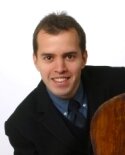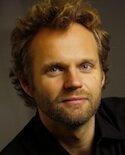
The Seattle Symphony’s principal cellist flew back from Turkey Tuesday just in time to overcome jet lag and perform triumphantly as soloist this week with the orchestra. Why was Efe Baltacigil (EFF-ay bahl-ta-jah-GIL) not in his first desk chair the past two weeks? With his brother Fora, a bass player, he was touring as soloist with the Berlin Philharmonic, a gig which can only draw luster to the Seattle Symphony.
For Thursday night’s concert (which repeats Saturday and Sunday), he performed Tchaikovsky’s Variations on a Rococo Theme with a reduced orchestra under guest conductor Thomas Søndergård.
The first impression he gave was of a big, smoothly burnished sound floating out from his instrument. He played the many variations with their technical challenges gracefully and with ease, with lightning runs and soulful singing, with drama here and exquisite slow passages there. All the while, elegant phrases and nuance abounded.
Søndergård kept the orchestra closely with him though the end note was a tad ragged. Kudos to hornist Mark Robbins for a gorgeous solo near the start.

As is now to be looked for in music director Ludovic Morlot’s programming, there was a clear theme to his choices. All three works—the original version of Mussorgsky’s A Night on Bald Mountain, the Tchaikovsky, and Sibelius’ Symphony No. 1—were completed within 22 years of each other towards the end of the 19th century, two from Russia, one from its near neighbor, Finland.
The three couldn’t be more different, each romantic and dramatic but in contrasting ways. In his debut here, the Danish Søndergård was an excellent choice to direct. One of the younger generation of conductors, on the podium he is a theatrical, even flamboyant person to watch, and he drew that kind of drama from the players. Sometimes his arms seemed to flail mindlessly but whenever it mattered, his work seemed decisive and his direction clear.
Mussorgsky, the undisciplined genius whose work appalled his colleagues with what they felt was unsuitable, unpolished results, has suffered in that Rimsky-Korsakov undertook to tone down and clean up Mussorgsky’s compositions. Bald Mountain, completed in 1867, was not heard as Mussorgsky wrote it until 1968.
As Søndergård conducted it, it’s a shocker from the first moments: raw, loud, wild, demonic, full of heated excitement. There are orderly moments which are less feverish, some soft, but the intensity holds throughout. Flute shrieks, bassooon blasts, growling percussion, short sharp bows on strings, the tempo never flags. Whew! It was like hearing it for the first time. One wonders if Stravinsky every came across this in the orginal before he wrote The Rite of Spring. It has that same feel of knock–you-flat if you’ve never heard anything like it before.
The Sibelius symphony was a fine choice to finish. Long and expansive, it has plenty of drama itself, and Søndergård brought out its emotional, romantic side, so it didn’t feel like a let-down after the Mussorgsky. Fine solos came from several members of the orchestra, notably Demarre McGill, flute, and Christopher Sereque, clarinet.
So far, this symphony season is proving one of fascinating juxtapositions, some of which don’t become apparent until the performance. I’m eager to hear whatever enterprising and unusual ideas Morlot comes up with in the weeks to come.